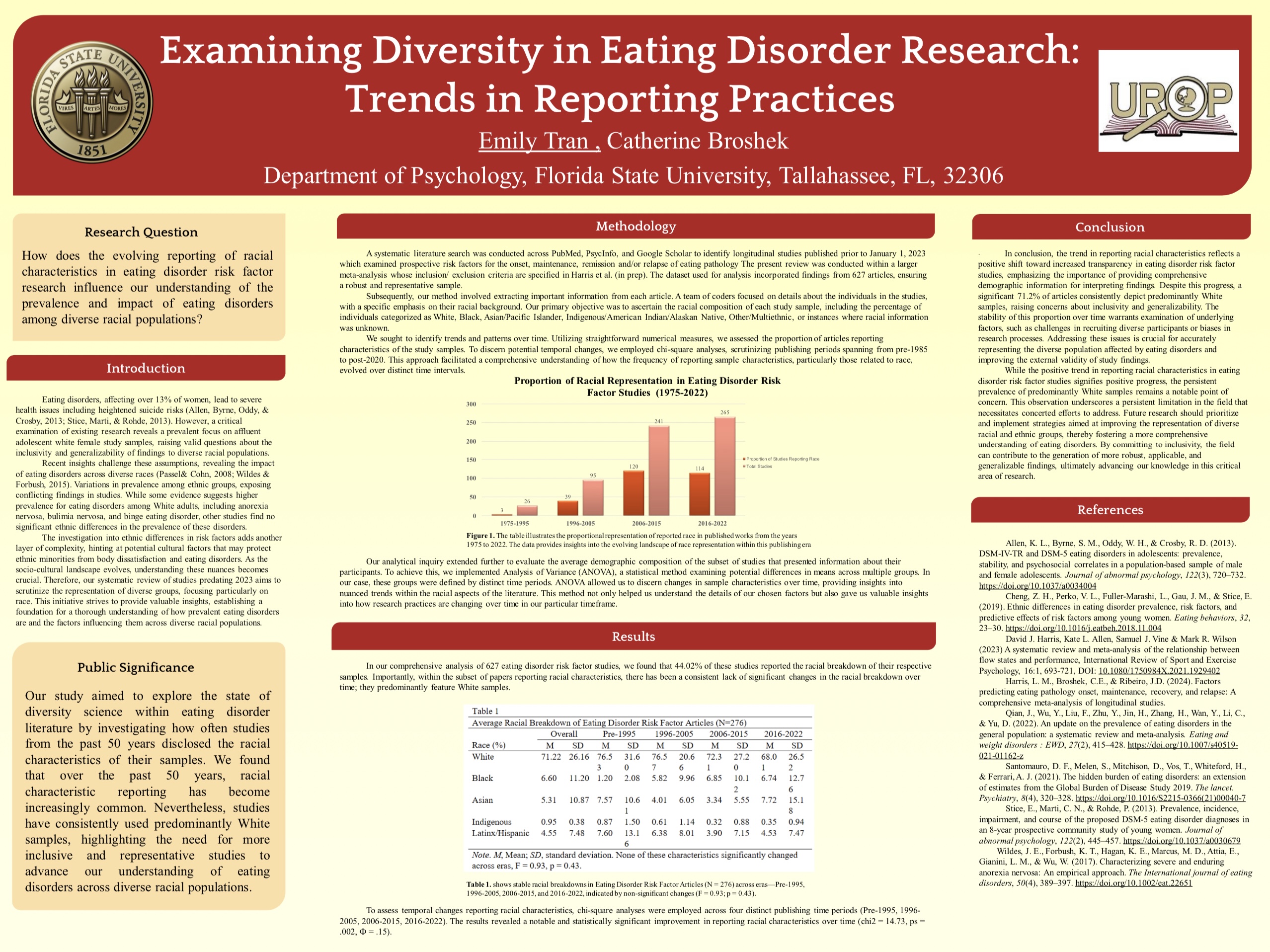Research Symposium
24th annual Undergraduate Research Symposium, April 3, 2024
Emily Tran Poster Session 4: 2:45 pm - 3:45 pm /40

BIO
Growing up in Miami, Florida, I've seen the importance of mental health support in diverse communities, inspiring my journey into clinical psychology. My focus is on researching prevention and stigma reduction for minority communities, such as racial minorities and the LGBTQ+ population, aligning with my hometown's rich cultural tapestry.
In my future career, I aim to empower individuals within these communities to overcome obstacles and cultivate resilience. Through tailored interventions and advocacy, I aspire to guide clients in identifying strengths and making positive changes in their lives. My goal is to bridge the gap between research and practice, implementing culturally sensitive strategies to promote mental health equity.
As a clinical psychologist, I'll engage in empowering activities like conducting assessments to identify problem areas, providing evidence-based interventions, and collaborating with clients to foster resilience. By integrating research, practice, and advocacy, I hope to make a meaningful impact on mental health outcomes for marginalized communities.
Growing up in Miami has shown me the vital role of advocacy in supporting diverse populations' mental health needs. It's not just about providing therapy—it's about advocating for change and creating a more inclusive and supportive environment for everyone.
Examining Diversity in Eating Disorder Research: Trends in Reporting Practices
Authors: Emily Tran, Catherine BroshekStudent Major: Psychology
Mentor: Catherine Broshek
Mentor's Department: Department of Psychology Mentor's College: Florida State University Co-Presenters:
Abstract
Eating disorders represent serious mental health conditions, with considerable research efforts dedicated to understanding their contributing factors (van Hoeken & Hoek, 2020). However, a critical limitation in existing literature is the disproportionate emphasis on a
primarily white affluent adolescent females. This narrow focus impedes a comprehensive understanding of eating disorders, which affect individuals across diverse racial backgrounds (Qian et al., 2021; Santomauro et al., 2019).
Addressing this gap, our study aims to examine the representation of diverse groups in eating disorder risk factor research, concentrating on
race. Through an examination of longitudinal studies predating 2023, focused on identifying risk factors associated with the onset, maintenance, relapse, or remission of eating disorders, we gauge the frequency of mentions of these factors and explore potential temporal changes. Additionally, we aim to scrutinize the demographic composition within these studies, assessing its alignment with the genuine racial diversity of individuals affected by eating disorders.
This research holds significance in enriching our understanding of eating disorders through a more inclusive lens. This includes analyzing the extent to which authors report the racial characteristics of their samples, tracking changes in reporting these details over time, exploring the typical racial demographic composition of the studied groups, and assessing the accuracy of these groups in representing the broader population affected by eating disorders. The goal is to enhance inclusivity in eating disorders research, contributing to diverse and equitable interventions aligned with the imperative for nuanced, personalized, and culturally sensitive care for diverse racial populations grappling with eating disorders.
Keywords: Psychology, Clinical Psychology, Eating Disorders, Meta-analysis, Race

